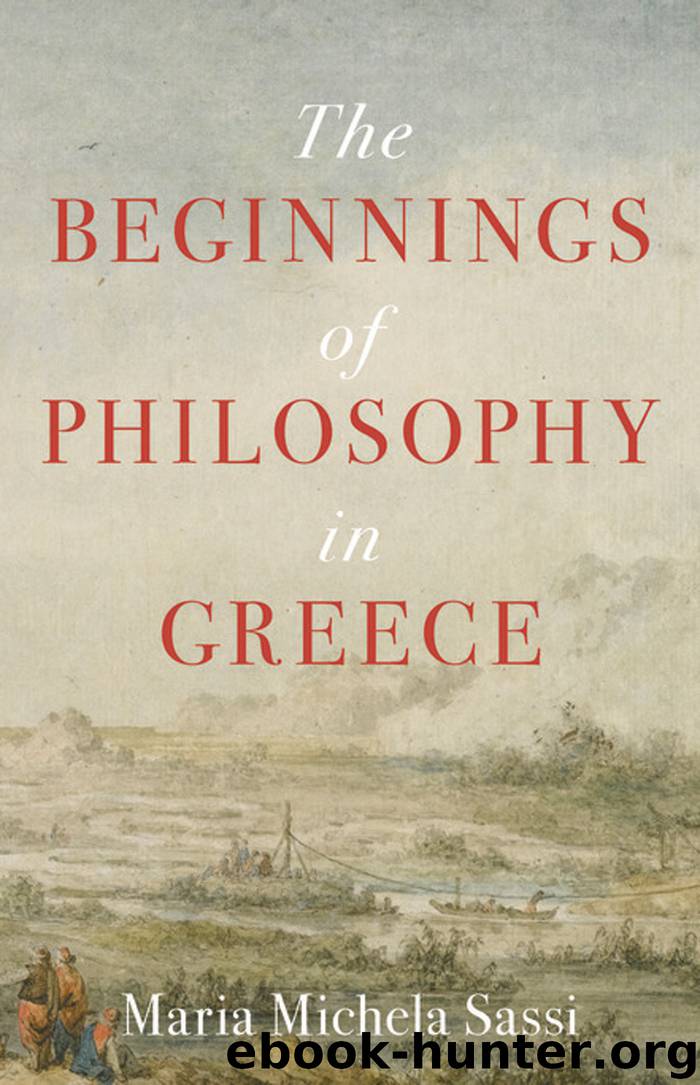The Beginnings of Philosophy in Greece by Sassi Maria Michela; Asuni Michele;

Author:Sassi, Maria Michela; Asuni, Michele;
Language: eng
Format: epub
Publisher: Princeton University Press
Published: 2018-03-14T16:00:00+00:00
1 Geoffrey Lloyd’s research has constantly insisted on these themes; see for instance Lloyd 1979, 1996, and 2002a, in particular p, 151ff. I should like to stress here—even though Lloyd does not—that we can already see the signs of second-order thinking in the Ionian cosmologies, consciously constructed using modalities outside the mythic tradition.
2 On this complex juncture, see the ever-illuminating Humphreys 1975, to which must be added Bravo 2002.
3 Cf. Horton 1967 and Valeri 1995.
4 See von Staden 1992, in particular 593ff. Meier (1986) noted that an experience as complex as that of the polis requires, in turn, an explanation in intellectual terms; we can think that a certain type of “social intelligence” among the Greeks stemmed from the need to face conditions of material and political precariousness. It is worth paying special attention in this framework to a few arguments by Zaicev (1993), who ascribed the “Greek miracle” to the process of social mobilization that took place in the archaic period, both “horizontally” (consider the relocation of high numbers of citizens from the fatherland to the colonies) and “vertically” (with the aristocracy’s gradual loss of power); according to Zaicev, this process instilled in large social strata the sense of an endowment of intellectual resources (the inheritance of the aristocratic “agonal spirit”) that could be spent competitively in the cultural and social space. Other points have been raised more recently by Krischer (2006).
5 On the debate regarding the reasons of Socrates’s trial, see Sassi 2015, 177–94.
6 On the relationship between Greek philosophy and religion in general, cf. Humpreys 1986, Most 2002, and Betegh 2006b.
7 But see Cambiano 1982 (and Vlastos [1947] is still illuminating on many points). See Sassi 2007, in particular 191–200, for a more detailed assessment of the viability of the concept of isonomia as an explanation of the idea of physical order that begins to be formulated in the Ionian context.
8 See Thomson 1955 and Seaford 2004, 181ff.
9 Hartog 2001 [1996], 81. One might certainly list a number of passages, especially by politically conservative authors such as Plato, which manifest a sense of hostility to change. Yet this does not prevent the same author from presenting a completely personal project (as is indeed the case in the Laws).
10 See Assmann 2011 [1992], especially 51ff and 81ff.
11 See Machinist 1986.
12 I reprise from Lloyd (1987) the main features of the panorama that follows, as well as the notion of “egotism.” Let us remember that Lloyd corroborated this diagnosis with his subsequent work, thanks to a close comparison with ancient Chinese science; see, for instance, Lloyd and Sivin 2002, 104ff.
13 See Averincev 1971–73, 17ff. Recent studies have cast significant doubt on the degree of subjectivity in archaic Greek poetry; a reading that pays attention to the needs and contexts of performance shows that the lyric “I” does not voice the individuality as much as the persona the poet takes up to represent a certain ideological position (see first and foremost Kurke 2007). But this perspective too refers to a
Download
This site does not store any files on its server. We only index and link to content provided by other sites. Please contact the content providers to delete copyright contents if any and email us, we'll remove relevant links or contents immediately.
The remains of the day by Kazuo Ishiguro(8341)
Tools of Titans by Timothy Ferriss(7743)
Giovanni's Room by James Baldwin(6754)
The Black Swan by Nassim Nicholas Taleb(6725)
Inner Engineering: A Yogi's Guide to Joy by Sadhguru(6408)
The Way of Zen by Alan W. Watts(6258)
Asking the Right Questions: A Guide to Critical Thinking by M. Neil Browne & Stuart M. Keeley(5322)
The Power of Now: A Guide to Spiritual Enlightenment by Eckhart Tolle(5295)
The Six Wives Of Henry VIII (WOMEN IN HISTORY) by Fraser Antonia(5199)
Astrophysics for People in a Hurry by Neil DeGrasse Tyson(4977)
12 Rules for Life by Jordan B. Peterson(4141)
Housekeeping by Marilynne Robinson(4021)
The Ethical Slut by Janet W. Hardy(4010)
Skin in the Game by Nassim Nicholas Taleb(3945)
Double Down (Diary of a Wimpy Kid Book 11) by Jeff Kinney(3880)
Ikigai by Héctor García & Francesc Miralles(3833)
The Art of Happiness by The Dalai Lama(3821)
Skin in the Game: Hidden Asymmetries in Daily Life by Nassim Nicholas Taleb(3700)
Walking by Henry David Thoreau(3660)
